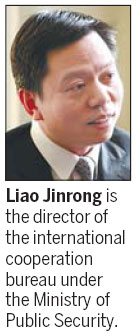262 fugitives repatriated to China in 2012
Updated: 2013-01-28 07:17
By Zhang Yan (China Daily)
|
||||||||
Success in repatriating criminals, but many still overseas: official
More than 800 fugitives were repatriated in the last eight years, a senior official from the Ministry of Public Security said.

Last year alone, 262 fugitives were repatriated, Liao Jinrong, director of the international cooperation bureau under the Ministry of Public Security, told China Daily in an exclusive interview.
The number accounts for nearly half of the 560 fugitives seized between 2005 and 2011.
Most of the fugitives were involved in white-collar crime.
"Police have been focusing more on fugitives in recent years. The hundreds of tipoffs provided by Chinese people living overseas has also helped," Liao said.
Most of the fugitives were officials suspected of corruption, employees from State-owned enterprises and people working in the financial sector, he said.
A number of high-profile fugitives were sent home, including Lai Changxing, who was found guilty of running a huge smuggling ring. He was deported from Canada in 2011. Gao Shan was another well-known fugitive now back in China. The former director of a Bank of China branch spent eight years on the run in Canada for financial fraud.
Most of the cases involving the former fugitives have been, or are set to be, before the courts, he said.
But Liao admitted that many fugitives are still at large. He did not disclose a precise number, but said that at least "a large number" of fugitives escaped to the United States, Canada, Europe and Southeast Asia.
The countries and regions where the fugitives have gone all have one thing in common - a track record of "rather weak cooperation" with China, he said.
"They know that once they get there, especially to the US and Canada, it will be very difficult for us to bring them back for trial," he said.
China has not signed extradition treaties with the US or Canada. "Plus, the judiciary in North America tend to be prejudiced against China's judiciary and procedures and are reluctant to assist in the repatriation of fugitives," he said.
Generally, it takes three to five years to bring back a fugitive, he said, though in some cases it takes much longer.
Lai, one of China's most notorious fugitives, is an example. Lai escaped to Canada with a tourist visa in 1999. He was extradited to China in July 2011 after a federal court in Canada rejected his appeal to suspend the repatriation order. That ruling ended a 12-year pursuit.
Lai was convicted in May 2012 of smuggling commodities and offering bribes and was sentenced to life imprisonment. The smuggled goods and taxes that he evaded were valued at nearly 40 billion yuan ($6.4 billion).
Liao said that police still have no idea how much Lai had transferred abroad. Getting the fugitive is one thing, but finding any hidden assets is another, he said. China's police have no power in foreign lands and they have to rely on international cooperation to investigate and retrieve funds, he said.
The Canadian authorities have not given any indication regarding cooperation in recovering Lai's illegal assets, he said.
Police estimate that thousands of economic fugitives have transferred "billions of yuan" of assets overseas, he said.
"The funds are usually used to purchase houses and cars in foreign countries. But some fugitives have spent the money on gambling and drugs," he said.
Some of the fugitives present a clear danger to their new homes. "They have no legal status and lead an unstable life, unable to secure a job to support themselves. Some of them end up being engaged in crimes, especially smuggling and drugs," he said.
In order to track down the fugitives and combat international crime, the ministry has sent 38 liaison officers to Chinese embassies in 23 countries and regions, including the US, Canada, France, Russia, Japan and South Africa.
They usually request local assistance in investigating and catching fugitives after Interpol issues warrants, he said.
So far, China has signed extradition treaties with 35 countries and regions, according to the ministry.
Li Lin, a lawyer from Beijing Municipal Lawyers' Association, said North America is the main destination for corrupt officials.
Liao said that the ministry has proposed to the US that the two countries establish a minister-level mechanism between China's Ministry of Public Security and the US Department of Homeland Security.
Dai Peng, professor at the Chinese People's Public Security University, said that police should take measures to stop corrupt officials before they flee or transfer assets abroad.
"In most cases, when corrupt officials are exposed, they have already transferred huge amounts overseas through underground banks or money laundering," Dai said.
zhangyan1@chinadaily.com.cn

 Li Na on Time cover, makes influential 100 list
Li Na on Time cover, makes influential 100 list
 FBI releases photos of 2 Boston bombings suspects
FBI releases photos of 2 Boston bombings suspects
 World's wackiest hairstyles
World's wackiest hairstyles
 Sandstorms strike Northwest China
Sandstorms strike Northwest China
 Never-seen photos of Madonna on display
Never-seen photos of Madonna on display
 H7N9 outbreak linked to waterfowl migration
H7N9 outbreak linked to waterfowl migration
 Dozens feared dead in Texas plant blast
Dozens feared dead in Texas plant blast
 Venezuelan court rules out manual votes counting
Venezuelan court rules out manual votes counting
Most Viewed
Editor's Picks

|

|

|

|

|

|
Today's Top News
Boston bombing suspect reported cornered on boat
7.0-magnitude quake hits Sichuan
Cross-talk artist helps to spread the word
'Green' awareness levels drop in Beijing
Palace Museum spruces up
First couple on Time's list of most influential
H7N9 flu transmission studied
Trading channels 'need to broaden'
US Weekly

|

|







